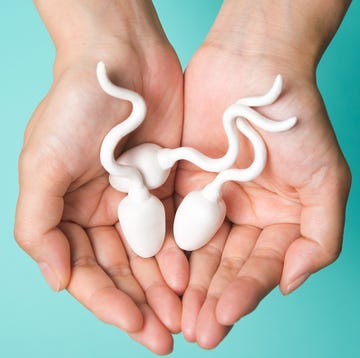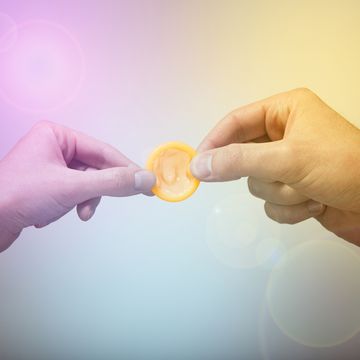You may have seen these headlines recently:
“We Finally Know Whether Or Not Being Circumcised Affects Sexual Pleasure”
“Sex is just as good if your penis is circumcised”
“Circumcision does NOT reduce sensitivity of the penis”
They’re all reporting on the same study from Queen’s University that examines differences in sensitivity between circumcised and intact penises.
But none of those headlines is exactly true.
For the study, 62 brave volunteers, half of whom were circumcised, allowed their penises to be tested for sensitivity in four different places: the head, two spots on the shaft, and the top of the foreskin if they were intact. The researchers also tested the subjects’ forearms for comparison.
The scientists looked at four different kinds of sensitivity: fine touch, pain, warmth, and heat pain.
Basically, they used a tiny thread to poke at the guys with increasing pressure until they could feel it, and then until it hurt. For the heat-related sensitivities, the researchers touched the subjects with a rod that heated up until they could detect the warmth, and then until it burned.
The big question: Is the foreskin more sensitive than the rest of the penis, which would mean that removing it makes your penis less sensitive than it could be?
The answer depends on which kind of sensitivity you’re talking about.
The foreskin is significantly more sensitive to fine touch than the other three locations on the penis, the study finds.
For detecting warmth, the foreskin is more sensitive than the head, but not the shaft.
There is no significant difference in pain or heat pain sensitivity between the foreskin and the other parts of the penis.
But the more important question is this: What do these tests have to do with sexual pleasure? Does being more sensitive to a burn or the touch of a thread make sex feel more intense?
Related: How to Pleasure a Woman—the Complete Guide to Becoming a Master Lover!
Scientists don’t know yet, says study author Jennifer Bossio, a Ph.D. candidate in clinical psychology at Queen’s University.
Interestingly, the subjects’ forearms are just as sensitive to fine touch as the foreskins. The forearm is even more sensitive to fine touch than the head and the shaft.
Does that mean we’re having sex all wrong—or that the fine touch test isn’t a great barometer for sexual pleasure?
Probably the latter, says Bossio.
“Some research suggests that the other three of the four tests—pain, warmth, and heat pain—activate the nerve fibers that are associated with sexual pleasure,” she says. “But that’s definitely something that we need to look into more.”
So here’s the more accurate headline: Scientists Still Aren’t Sure How Circumcision Affects Sexual Pleasure.
It might reduce sensitivity in bed. It might not. It might vary from person to person. In her study, Bossio concludes that any potential effect is “minimal.”
That’s not to say sex with a foreskin is identical to sex without.
Some uncut men say that the foreskin rolls back and forth over the head during masturbation and intercourse in a way that feels good. That’s a sensation circumcised guys will never experience.
Your partner may be able to feel a difference, too.
In the book Sex Made Easy, Debby Herbenick, Ph.D., writes of her first experience with an uncut man: “I could feel his foreskin move along my vaginal walls during sex. It was a new sensation to me and a wonderful one. . . . Feeling his foreskin also seemed to make it easier to experience orgasm during vaginal intercourse.”
But a 2013 review in the Journal of Sexual Medicine suggests that foreskin does not make or break your sex life, concluding that circumcision doesn’t harm sexual function, sensation, satisfaction, or pleasure.
Related: The Men’s Health Guide to Erectile Dysfunction: What Causes It and How to Treat It
For better or for worse, most men are stuck with the decision made by their parents. Nearly 60 percent of male newborns in the U.S. get circumcised at birth, according to the Centers for Disease Control and Prevention.













